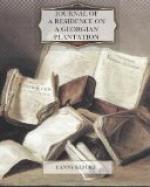floor, the soil itself, damp with perpetual drippings
from the holes in the roof, and the open space which
served for a window was protected only by a broken
shutter, which, in order to exclude the cold, was
drawn so near as almost to exclude the light at the
same time. Upon this earthen floor, with nothing
but its hard damp surface beneath him, no covering
but a tattered shirt and trowsers, and a few sticks
under his head for a pillow, lay an old man of upwards
of seventy, dying. When I first looked at him
I thought by the glazed stare of his eyes, and the
flies that had gathered round his half open mouth,
that he was dead: but on stooping nearer, I perceived
that the last faint struggle of life was still going
on, but even while I bent over him it ceased; and
so, like a worn-out hound, with no creature to comfort
or relieve his last agony, with neither Christian solace
or human succour near him, with neither wife, nor
child, nor even friendly fellow being to lift his
head from the knotty sticks on which he had rested
it, or drive away the insects that buzzed round his
lips and nostrils like those of a fallen beast, died
this poor old slave, whose life had been exhausted
in unrequited labour, the fruits of which had gone
to pamper the pride and feed the luxury of those who
knew and cared neither for his life or death, and
to whom, if they had heard of the latter, it would
have been a matter of absolute though small gain,
the saving of a daily pittance of meal, which served
to prolong a life no longer available to them.
I proceed to the next item in your observer’s
record. All children below the age of twelve
were unemployed, he says, on the estate he visited:
this is perhaps a questionable benefit, when, no process
of mental cultivation being permitted, the only employment
for the leisure thus allowed is that of rolling, like
dogs or cats, in the sand and the sun. On all
the plantations I visited, and on those where I resided,
the infants in arms were committed to the care of
these juvenile slaves, who were denominated nurses,
and whose sole employment was what they call to ‘mind
baby.’ The poor little negro sucklings
were cared for (I leave to your own judgement how
efficiently or how tenderly) by these half-savage slips
of slavery—carried by them to the fields
where their mothers were working under the lash, to
receive their needful nourishment, and then carried
back again to the ‘settlement,’ or collection
of negro huts, where they wallowed unheeded in utter
filth and neglect until the time again returned for
their being carried to their mother’s breast.
Such was the employment of the children of eight or
nine years old, and the only supervision exercised
over either babies or ‘baby minders’ was
that of the old woman left in charge of the infirmary,
where she made her abode all day long and bestowed
such samples of her care and skill upon its inmates
as I shall have occasion to mention presently.
The practice of thus driving the mothers a-field,




